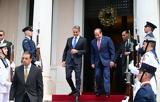Greece and Egypt Defuse Tensions Over Historic Sinai Monastery
Despite the seriousness of the threat, the issue received little public attention and was initially mishandled diplomatically.
A potentially destabilizing crisis between Greece and Egypt was quietly averted this week, as the leaders of the two countries addressed a sensitive religious and cultural issue that had threatened to strain their longstanding
The crisis had been building for nearly a decade. In 2015, during a period of influence by the Muslim Brotherhood in Egypt, the Egyptian government attempted to assert control over 71 properties belonging to the monastery, including its buildings in Sinai and assets in the Greek city of Kavala. Because the monastery lacked formal legal status within Egypt’s legal system, the state could have, under legal pretexts, reclassified the monastery as a tenant on its own land through a long-term usufruct agreement or sought full ownership through the courts. Had this gone forward, it would have drastically undermined the historical presence of the Greek Orthodox Church in Sinai and could have triggered a broader diplomatic and religious backlash.
Despite the seriousness of the threat, the issue received little public attention and was initially mishandled diplomatically. In a controversial move, the Greek embassy in Cairo reportedly endorsed the proposed agreement and encouraged the 94-year-old abbot of the monastery to sign it, raising questions about the consistency of Greece’s foreign policy stance on matters of religious heritage and sovereignty.
The turning point came when Father Porphyrios, head of the monastery's representative office in Athens, along with Greece’s Secretary General for Religious Affairs, Giorgos Kalantzis, brought the matter to the attention of senior government officials. Their intervention, coupled with the involvement of Deputy Foreign Minister Alexandra Papadopoulou—who firmly rejected the proposed agreement—helped steer the situation in a new direction. Crucially, Prime Minister Mitsotakis, personally familiar with the significance of the monastery since his youth, engaged directly with President el-Sisi, urging a political solution.
In response, the Greek government passed legislation formally recognizing the monastery’s office in Athens as a public legal entity—a move designed to bolster its legal status and serve as a model for reciprocal recognition in Egypt. The measure helped secure the monastery’s rights and symbolized a mutual commitment to preserving cultural and religious institutions that transcend national borders.
President el-Sisi, for his part, distanced himself from the actions of his government’s administrative services, publicly expressing his dismay upon learning of their intentions. He reaffirmed Egypt’s respect for the Greek Orthodox community and highlighted his government’s broader efforts to restore Christian sites damaged by extremism in previous years.
The warm tone of the meeting between Mitsotakis and el-Sisi suggested that the threat of a diplomatic rift has not only been neutralized but has instead laid the groundwork for a deeper understanding between the two nations. By addressing a religious dispute with such potentially far-reaching consequences, Greece and Egypt managed not only to avert a crisis but to affirm their shared commitment to cultural and religious coexistence in a region often defined by its tensions.
#GREECE- Δημοφιλέστερες Ειδήσεις Κατηγορίας Ειδήσεις
- Eurovision: Η περυσινή εκπρόσωπος του Ισραήλ τα χώνει στην Μαρίνα Σάττι - Από τις πιο αηδιαστικές ήταν η Ελληνίδα...
- Τραγωδία στην Κρήτη: Γυναίκα κατέρρευσε και πέθανε μπροστά στην κόρη της
- Aν το 2010 αγοράσατε αυτά τα sneakers ψάξτε που τα έχετε καταχωνιάσει: Επέστρεψαν!
- Tροχαίο στη Ρόδο: Κατέληξε στο νοσοκομείο η τουρίστρια που ακρωτηριάστηκε
- Greece and Egypt Defuse Tensions Over Historic Sinai Monastery
- Ρόδος: Πέθανε η γυναίκα που ακρωτηριάστηκε μετά το τροχαίο στο Φαληράκι
- Ρόδος: Κατέληξε η Γερμανίδα τουρίστρια που παρασύρθηκε από 19χρονο οδηγό
- «Θα έχω πάντα τις αναμνήσεις της καλοσύνης στην καρδιά μου» - Αφού κατέδωσε τον Unabomber, ο αδερφός του πέρασε χρόνια προσπαθώντας να ξανακερδίσει την αγάπη του
- Αυτό το συμπλήρωμα φτιάχνει την ψυχολογία και δεν έχει παρενέργειες
- Τροχαίο στον Ωρωπό: Νεκρός ένας 47χρονος μοτοσικλετιστής
- Δημοφιλέστερες Ειδήσεις Dikaiologitika
- Greece and Egypt Defuse Tensions Over Historic Sinai Monastery
- Greece Races to Revise EU Recovery Plan Amid Risk of Losing Billions
- Ελληνικό: Νέο θρίλερ με απανωτούς θανάτους στην ίδια οικογένεια (βίντεο)
- Πρωτοβουλίες και εκδηλώσεις για τη συμπόρευση του προοδευτικού χώρου
- Σαββατοκύριακο χωρίς πορτοφόλι με street πάρτι, κοκτέιλ και πατίνια
- Περιστέρι: Οδηγός ΙΧ παρέσυρε και εγκατέλειψε μοτοσικλετιστή - Βίντεο ντοκουμέντο
- Σεισμός τώρα στην Κεφαλονιά
- Αλλάζουν όλα στην Υγεία μέχρι το τέλος του 2025
- Στην Ουκρανία Μέρτς, Στάρμερ, Μακρόν, Τουσκ: Καλούν τη Ρωσία σε μια «άνευ όρων 30ήμερη εκεχειρία»
- Αυστηρό μήνυμα Τραμπ σε Πούτιν - Ζελένσκι: «Βάλτε τέλος σε αυτόν τον ηλίθιο πόλεμο»

- Τελευταία Νέα Dikaiologitika
- Greece and Egypt Defuse Tensions Over Historic Sinai Monastery
- ΣΥΡΙΖΑ: Live η ομιλία Φάμελλου στη συνεδρίαση της ΚΕ
- Greece Races to Revise EU Recovery Plan Amid Risk of Losing Billions
- Youth Pass: Λίγες ημέρες ακόμα για τις αιτήσεις, πότε κλείνει η πλατφόρμα
- Σαββατοκύριακο χωρίς πορτοφόλι με street πάρτι, κοκτέιλ και πατίνια
- Χάρης Δούκας: Σε διαρκή κρίση η Δημοκρατία, δεν πρέπει να γίνουμε ίδιοι με ό,τι αφορίζουμε
- Εκλογικός «πυρετός» στην Αλβανία: Τι δείχνουν οι δημοσκοπήσεις
- Πρωτοβουλίες και εκδηλώσεις για τη συμπόρευση του προοδευτικού χώρου
- Ο Τραμπ δίνει δωρεάν πτήσεις σε μετανάστες για να φύγουν από τις ΗΠΑ
- Αλλάζουν όλα στην Υγεία μέχρι το τέλος του 2025
- Τελευταία Νέα Κατηγορίας Ειδήσεις
- Αδιανόητο: Απαγόρευσαν στον Πέτρο Δαμιανό την είσοδο στις φυλακές Αυλώνα
- Πρέβεζα: Γάλλος κυβερνήτης τουριστικού σκάφους μαχαιρώθηκε από συνεπιβάτη του!
- Αγ. Νικόλαος: Ζευγάρι συνελήφθη για κατοχή και διακίνηση ναρκωτικών
- Σέρρες: Τροχαίο ατύχημα με σοβαρά τραυματία έναν 19χρονο
- Συνελήφθη αλλοδαπός για σειρά διαρρήξεων στα Ιωάννινα
- Ενρίκε: «Είμαστε υπερήφανοι για αυτό που έχουμε πετύχει»
- Διάσωση 82 αλλοδαπών από το Λιμενικό και τη Frontex νότια της Γαύδου
- Κυβέρνηση: Επόμενος σταθμός «32%»
- Μαρινάκης: Φοιτητές που συλλαμβάνονται για βία στα πανεπιστήμια θα χάνουν άμεσα την ιδιότητά τους για δύο χρόνια



